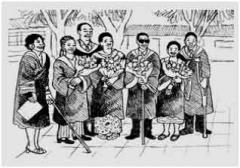Your progress
0%
complete
Learn about how a community in Rwanda lobbied for inclusive and accessible secondary and higher education for students with disabilities


Over a million people were murdered in the genocide in Rwanda in the 1990s. This left many orphans and huge economic and social challenges. In 1997, strenuous negotiations between the Rwanda Blind Union, Evariste Karangwa (the head teacher of Gahini secondary school) and the Ministry of Education resulted in the first visually impaired students being admitted to secondary school in Rwanda. Within the next five years, a total of 33 blind students were enrolled. A parents’ fundraising committee, established to support the education of these students, became an income-generation initiative, involving parliamentarians, religious leaders, local leaders, parents, teachers and students, conducting charity walks, plays and dances, and selling farm produce. Eventually, the committee raised enough funds to create a resource room, housing for volunteer staff, and a reading room.
Several years later, the students started lobbying for university admission. The pioneering head teacher, Evariste Karangwa, was now working at the Institute of Education and he was asked to lead a team of 12 educationalists and activists to promote the inclusion of these students. Local newspapers already reported that it was now law that universities should include students with disabilities. The National Federation of the Disabled had compiled a list of over 250 students with disabilities who had qualifications but could not gain access to university.
Evariste and the team developed a phased plan, and over the following year, students with visual, hearing and mobility impairments enrolled in university courses on law, languages, journalism, medical studies and education. In addition, the team arranged for compulsory information and awareness-raising days for staff, and held a seminar on Braille. The Association of Disabled Students staged a play on “denial of our educational rights and its impact on our contributions to society”. The previous Minister of Education who had lobbied for inclusion attended. The whole audience was astounded at the depiction of students with disabilities working as lawyers, secretaries, computer operators and other professionals. People with disabilities in Rwanda continue to assert their permanent right to higher education.